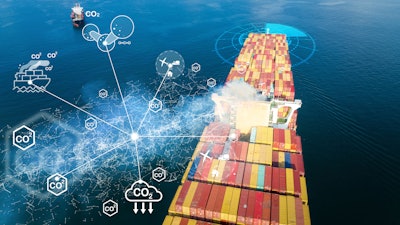
Yellow Boat/stock.adobe.com
VesselBot launches the 2nd Global Container Vessel Emissions Report, which provides insights into the state of maritime sustainability, offering a nuanced understanding of emissions across the container shipping industry from 2021-2023.
"In today's world, accurate and reliable data are the cornerstones of informed decision-making. Our 2nd Global Container Vessel Emissions Report will empower stakeholders with the insights they need to navigate the complex landscape of maritime sustainability," says Constantine Komodromos, CEO of VesselBot.
Key Takeaways:
- Vessel Group Emissions: The report unveils notable fluctuations in emissions, shedding light on advancements in technology and operational efficiencies within the maritime sector. These insights reflect the industry's commitment to reducing its carbon footprint.
- Flag State Impact: National policies wield substantial influence over maritime environmental practices. The report delves into the impact of flag states, emphasizing the importance of regulatory frameworks in shaping industry behavior.
- Regional Variations: Geographical and economic factors play a pivotal role in emissions. Regional variations underscore the diversity of operational variances such as vessel speed, age, size and distance traveled, highlighting areas of progress and opportunities for improvement.
- Trade Lane Efficiency: Emission levels vary significantly across trade lanes, emphasizing the critical role of route optimization and the need for technological upgrades in achieving sustainability goals.
- The report provides insights that empower industry players to make informed decisions. Shippers, carriers, and policymakers need to unite in a collaborative effort to utilize accurate primary emission data effectively. This data can empower them to enhance decision-making regarding eco-friendly technologies, optimize operational practices and ensure compliance with international environmental standards.















![Pros To Know 2026 [color]](https://img.sdcexec.com/mindful/acbm/workspaces/default/uploads/2025/08/prostoknow-2026-color.mduFvhpgMk.png?ar=16%3A9&auto=format%2Ccompress&bg=fff&fill-color=fff&fit=fill&h=135&q=70&w=240)


